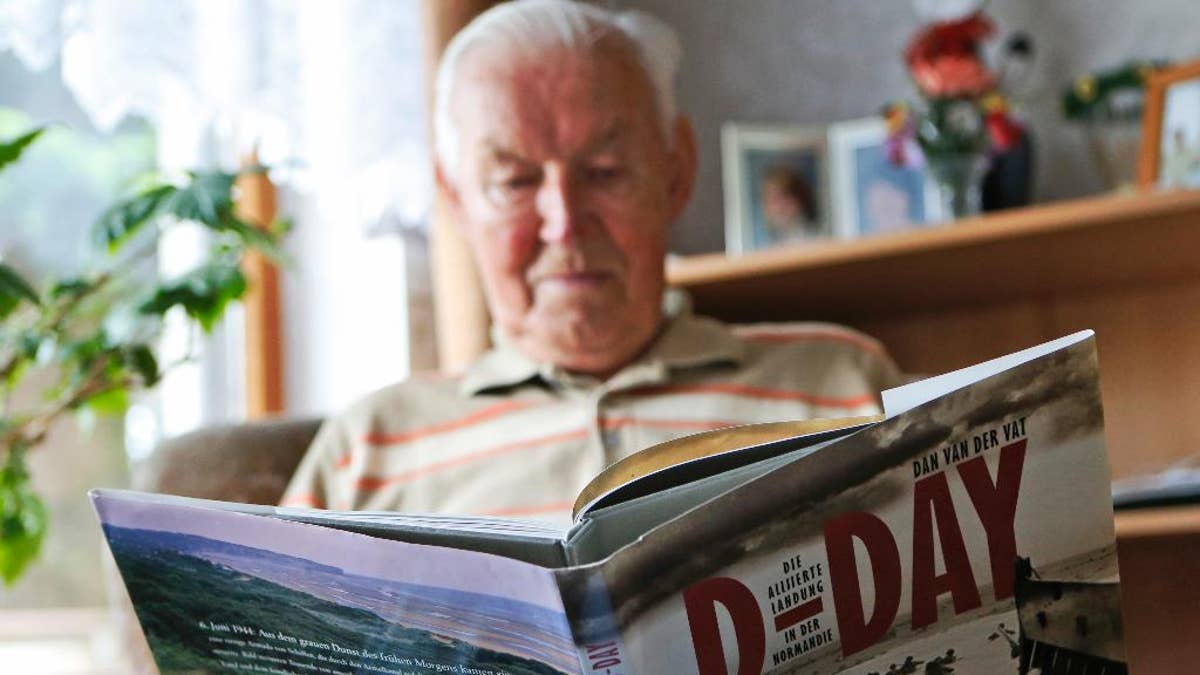
May 28,2014: In this file picture, Germany' s World War 2 and D-Day veteran Paul Golz reads in a book during an interview with the Associated Press in his hometown Koenigswinter, Germany. Paul Golz, one of a few German veterans who plans to attend this week’s events marking the 70th anniversary of the D-Day invasion, recalls the generosity of an Allied soldier in Normandy and his luck at being taken prisoner by Americans instead of being sent to fight on the eastern front. (AP)
KOENIGSWINTER, Germany – Paul Golz, one of a few German veterans who plans to attend this week's events marking the 70th anniversary of the D-Day invasion, saw his war end on the fields of Normandy, but thinks himself lucky that he was taken prisoner by Americans instead of being sent to fight on the eastern front.
Golz is joining German Chancellor Angela Merkel at commemorations in Normandy on Friday to honor D-Day's victims and celebrate the end of a war that tore Europe apart.
The international ceremonies — which will include President Barack Obama, Queen Elizabeth II and other world leaders — will focus on the Allies and the massive invasion that helped them win World War II. But Germans have also been included in D-Day ceremonies over the past several years, in a demonstration of Europe's unity today. Some 22,000 German soldiers are among the many buried around Normandy.
A 19-year-old private in June 1944, Golz was assigned to a machine gun team that made up the defenses in the region around Sainte-Mere-Eglise — the first village in Normandy that the Allies seized from Nazi control.
He awoke in the early hours of the morning to the sight of flares being dropped by Allied parachutes. Hunger overcame fear, and he ventured into a village to try to scrounge up some milk, and bumped into residents.
"The French told me 'Listen, get lost — the Allies have landed,'" he said.
His unit was sent to fight at Sainte-Mere-Eglise later that day, and Golz encountered his first American — a paratrooper with a white sock over the end of his rifle, waving it in surrender.
"Then I moved toward him and switched off the safety on my rifle," Golz remembered. "He didn't shoot at me so there was no reason for me to shoot at him. He had already dropped his gun. He was shaking, the poor man."
Golz didn't know any English, but said in German "I will not harm you" in a calm voice.
The soldier approached him, and Golz took him prisoner.
Three days later, on June 9, Golz became a prisoner himself.
He was with his machine gun unit protecting the withdrawal of his company when he came face to face with an American tank in a field. And Golz's war was over.
Today, aged 89, he recalls being marched to the coast and then brought to a British boat where all the prisoners were given their first square meal in days — or in Golz's case, several square meals.
"I told myself, man I want another meal — and I queued for a third time and ate for the third time," he remembered. "Then a British officer shouted — 'what the hell is going on here? We only have 800 POWs on board but 3,000 eat?"
Golz was shipped to New York with 2,000 other Germans, and then taken to a POW camp.
He returned to Germany in 1947, and worked on a farm before joining the foreign service, which took him to embassies in Africa and a long and peaceful government career.
Reflecting on his wartime past, he said it was a stroke of luck that he was sent to Normandy and ended up in American hands rather than being sent by the Nazis to fight on the eastern front, where the fighting was fierce and some of his comrades were killed.
His time in France and as a POW also taught him French and English, which helped launch his foreign service career.
"I had a guardian angel," he says.




















